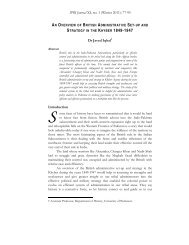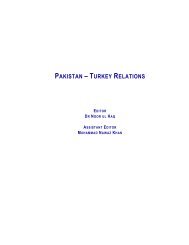120 Whither Kashmir? (Part II) - Islamabad Policy Research Institute
120 Whither Kashmir? (Part II) - Islamabad Policy Research Institute
120 Whither Kashmir? (Part II) - Islamabad Policy Research Institute
You also want an ePaper? Increase the reach of your titles
YUMPU automatically turns print PDFs into web optimized ePapers that Google loves.
28 IPRI Factfile<br />
Gilani while talking to media at this occasion said we should not<br />
make haste but wait for India’s reply on including the <strong>Kashmir</strong> issue in<br />
composite dialogue process. He expressed hope that composite dialogue<br />
between the two countries will resume soon.<br />
News International (Rawalpindi), February 11, 2010.<br />
PAKISTAN-INDIA TALKS<br />
Resort to coercive diplomacy by India to get Pakistani compliance on the<br />
Mumbai terrorist attacks had already alienated Pakistani public opinion;<br />
the threatening statements from the Indian military and political<br />
leadership, and the treatment meted out to Pakistani cricketers in IPL<br />
selection led to the renewal of the old blame game between <strong>Islamabad</strong> and<br />
New Delhi In a significant development, Pakistan and India have moved<br />
to soon open bilateral talks at foreign secretaries’ level on an open-ended<br />
agenda that is also likely to cover the water issue and counter-terrorism.<br />
The move comes after more than 14 months of hiatus in relations<br />
between the two countries following the November 26, 2008 terrorist<br />
attacks in Mumbai. The attacks led to unilateral suspension of the four<br />
year old Composite Dialogue process under which <strong>Islamabad</strong> and New<br />
Delhi had completed four rounds of bilateral talks for resolving their<br />
disputes, including the dispute over Jammu and <strong>Kashmir</strong>.<br />
Defying persistent calls from Pakistan as well as from the other<br />
leading members of the international community, the Indians had made<br />
the resumption of the Composite Dialogue process contingent on what<br />
they called credible progress by Pakistan on the prosecution of those<br />
suspected to be involved in the Mumbai attacks. Although no dramatic<br />
breakthrough is expected, the initiative is a welcome development for<br />
easing tension between the two countries, which was escalating due to a<br />
communication break and a spate of hostile statements from both sides.<br />
The move has also come amidst the mix of hope and despair<br />
witnessed during the last more than one year, regarding the prospects of<br />
the revival of the peace process. It was believed, and even some leading<br />
sections of the Indian media shared this belief, that the conclusion of the<br />
15th Lok Sabha elections in May last year would enable the new United<br />
Progressive Alliance (UPA) government to restart talks with Pakistan;<br />
but the bellicose rhetoric by the Indian leaders foreshadowed the<br />
prospects, if there were any, for bringing the peace process again on<br />
track. Hopes were again rekindled when President Asif Ali Zardari met




